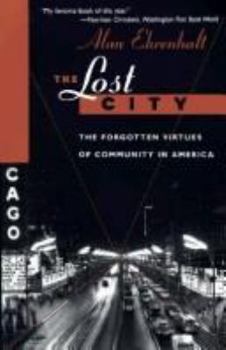The Lost City: Discovering the Forgotten Virtues of Community in the Chicago of the 1950s
Select Format
Select Condition 
Book Overview
Millions of Americans yearn for a lost sense of community, for the days when neighbors looked out for one another and families were stable and secure. The 1950s are regarded as the golden age of... This description may be from another edition of this product.
Format:Hardcover
Language:English
ISBN:0465041922
ISBN13:9780465041923
Release Date:September 1995
Publisher:Basic Books
Length:320 Pages
Weight:1.06 lbs.
Dimensions:1.1" x 5.8" x 8.6"
Customer Reviews
5 ratings
A provocative social history of the 1950s
Published by Thriftbooks.com User , 23 years ago
Alan Ehrenhalt's premise is a provocative one: People in the 1950s were happy, and they were happy because they accepted authority. The book is a rebuttal to all those who portray the 1950s as the 'dark ages' of US history, and the author argues that even blacks were better off than popularly believed. Ehrenhalt takes us to three Chicago neighborhoods: the Southwest Side with its working-class Catholic population, the suburban community of Elmhurst, and the black ghetto of Bronzeville. In each, he shows that people in the 1950s were content with their lives, and in many ways were better off than they are now. Even Chicago's black ghetto had a multitude of black-owned businesses and black social organizations, which have since vanished, replaced by nothing but vacant lots and failed housing projects. This is a provocative work of social history that challenges our image of the 1950s, and in addition, it challenges our assumptions about the benefits of free choice and the 'evil' of obedience to authority.
A tour de force...
Published by Thriftbooks.com User , 23 years ago
It is not often one encounters a scholarly work that is difficult to put down, but The Lost City is just that. I found this book to be immensely readable. Ehrenhalt's writing style is fluid and intriguing. By zeroing in on the individuals and communities that were archetypes of social conditions in the 1950s, the author is able to ground his argument solidly, while weaving an interesting dialogue of people and community.If you have ever wondered about the "Fabulous Fifties" and what its communities were like, this is the book for you. Those longing for the security and morals of that decade may well be surprised by what was necessary of its citizens. The Lost City is a great read, and belongs on the shelf of anyone interested in society, community, and change.
An enlightened look at post-WWII American culture
Published by Thriftbooks.com User , 24 years ago
This is a wonderful book which stayed with me for days after reading it. The author essentially boils down the cultural differences between pre and post 1960s America to the rise of personal freedom along with its inherent companion, the demise of societal authority. He does so with a mixture of anecdote and fact, ignoring the mainstream stereotypical view of that era, making for an easy and engaging read.Whether you view that time through the prism of the establishment, the dispossessed, or the child of either, you will find plenty here to mull as we approach the next phase of our evolving American culture. A fun, interesting read.
Makes you think about cultural myths
Published by Thriftbooks.com User , 25 years ago
If you've read The Baffler Magazine and its collection "Commodify Your Dissent" or "Habits of the Heart" that describes todays culture, this book presents a picture that contrasts: the 1950's in Chicago...not so pretty, but not so aweful as the movie Pleasantville common depiction would lead us to believe, either.
A thoughtful, controversial look at community.
Published by Thriftbooks.com User , 26 years ago
This is an excellent book that challenges many of the commonly held assumptions about progress. It's almost an elegy to the 1950s, before the Baby Boomers imploded authority, institutions and religious belief. Now these same Boomers curiosly wonder why the streets aren't safe and our popular culture revolves around money and sex. Boomers wanted more individual autonomy and, in the process, they had to destroy the institutions that held communities together--churches, schools, families. Ehrenhalt illustrates his thesis by concentrating on several neighborhoods in Chicago in the 1950s. The history and the real-world stories of the people involved make it very interesting reading. He does a great job (worthy of a novelist) of evoking the character of the time with lots of interesting detail. What's controversial about the book is his belief (contrary to today's requisite belief in empowerment)that most people want rules, regulations, guides, authority. They want a Catholic Church to tell them right from wrong. They want a community that enforces its values. "The Lost City" is an excellent history that will make anyone think about the condition of America in 1990s.





